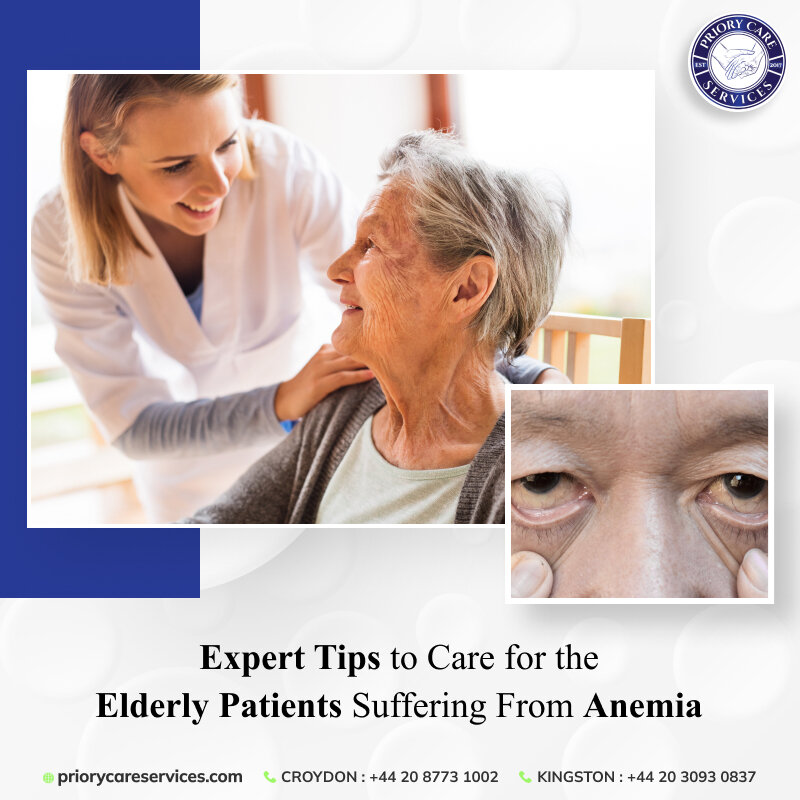Many older people suffer from anemia, a common illness that can significantly lower their quality of life. In fact, in a study on older adults, it has been found that in Europe the prevalence rates for anemia range from 8 to 25%. As reputable care providers in Croydon, we comprehend the significance of providing excellent care to elderly anaemic patients as they face a lot of struggles to live a normal life. In this blog, we’ll provide helpful advice for giving these people top-notch care while emphasizing the crucial role that Croydon’s caregivers and care companies play in the community.
Understanding Anemia in the Elderly
Let’s briefly discuss senior anemia before moving on to our caring advice. A lack of red blood cells or a reduction in the amount of haemoglobin in the blood are two symptoms of anemia. This may result in symptoms like weakness, exhaustion, shortness of breath, and vertigo. Anemia in older adults can result from a number of things, such as nutritional deficits, long-term conditions, and drug adverse effects.
Tip #1: Consistent monitoring and evaluation
Regular monitoring and evaluation are key components of caring for elderly anaemic patients. Croydon healthcare professionals should carry out routine evaluations to monitor the patient’s haemoglobin levels and find any potential causes or aggravating factors of anemia.
Tip #2: Provide nutrition support
Nutritional deficiencies, especially in iron, vitamin B12, and folate, can cause anemia. By organizing and preparing meals that are high in these necessary elements, care providers in Croydon may provide beneficial nutritional support. In order to combat anemia, older individuals must obtain the vitamins and minerals they require.
Tip #3: Managing your medications
Elderly anaemic people may occasionally need prescription drugs or nutritional supplements to treat their condition. Care providers are essential in medication management because they make sure that prescriptions are taken as prescribed and keep an eye out for any negative side effects.
Tip #4: Drink Plenty of Water
For those who have anemia, drinking enough water is essential since it keeps blood volume and circulation at a healthy level. Elderly people should be encouraged to drink adequate water throughout the day by their caregivers, particularly if they are on drugs that can cause dehydration.
Tip #5: Fall Prevention
Weakness and exhaustion brought on by anemia might raise the danger of falls and associated injuries. By making the required home changes, offering mobility aids, and making sure the setting is secure, caregivers can take proactive steps to prevent falls.
Tip #6: Frequently Transfuse Blood
Elderly patients who have severe anemia could need regular blood transfusions. In that case, having an experienced care provider by the side can be helpful as they have knowledge, and contacts, so can collaborate closely with medical professionals to plan and carry out these transfusions, ensuring that everything goes smoothly and safely.
Tip #7: Support for Transportation
Transporting elderly anaemic patients to and from appointments with haematologists or primary care doctors, for example, may require assistance. Transport can be arranged by healthcare professionals, ensuring that patients receive the required procedures and follow-up care.
Tip #8: Offer Emotional Support and Company
Anemia is a chronic ailment that can be emotionally taxing to live with. To support patients in maintaining a positive outlook and mental health, caregivers should provide emotional support, company, and a sympathetic presence.
Tip #9. Coordination With Medical Personnel
Giving elderly anemia patients full care requires effective coordination and communication with other medical specialists. Caregivers who are hired from top care agencies in Croydon providing easy communication between caregivers and medical professionals.
Tip #10. Encourage Physical Activity
For senior people with anemia, regular physical activity and exercise, adapted to the patient’s capacities, can have a variety of positive health effects. Patients should be encouraged and assisted by care professionals to engage in suitable physical activities, which can enhance general health and increase vitality.
Here are some of the top joyful activities that elderly people can enjoy at home.
Take away
Elderly people with anemia require holistic care that includes their physical, emotional, and medicinal requirements. The help and skills these people need to manage their condition and improve their general well-being effectively are crucially provided by care agencies and providers in Croydon.
These best practices can assist caretakers in significantly improving the lives of elderly anaemic patients, enabling them to live healthier, more fulfilled lives despite the difficulties this condition presents. At Priory Care Services based in Croydon you will be able to hire the most dedicated care providers in Croydon who are recognized for providing great care to Croydon’s senior citizens, particularly those who have anemia. We are also here to assist patients and their families as they make the transition to better health and well-being.




